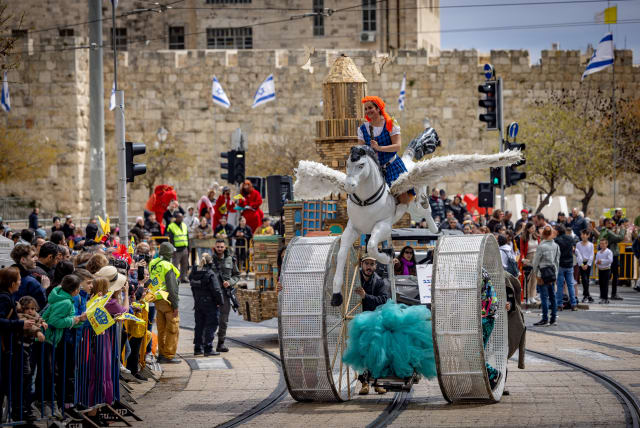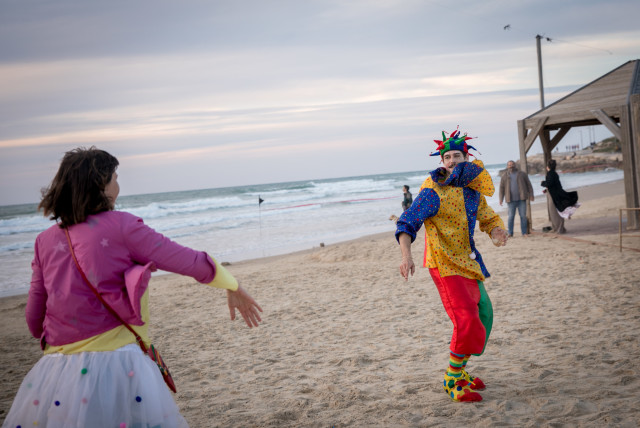What we can learn from Purim and Passover in our ever-complicated reality - opinion

As the seasons change and we move from Purim to Passover, we must cleanse our battered souls and, for so many, battle-scarred memories too.
Transitioning from our prolonged Purim weekend to Passover next month is transcendent. As spring buds, excitement mounts, and redemption looms.
Purim celebrates Jewish dignity, the freedom to be Jewish anywhere; Passover celebrates Zionist responsibility, the freedom to be Jewish at home, as we leave luscious but enslaving lands to live fulfilled Jewish lives in Israel. Purim highlights individual heroes, Esther and Mordechai, fighting for freedom; Passover emphasizes how we, individually and collectively, must fight to free ourselves from all forms of slavery.
Purim pivots around anti-antisemitism, remembering how the evil Amalekites harmed us; Passover turns this around, going from negative to positive, nurturing proud Jewish identities by remembering differently – remembering the Shabbat, embracing the good, not just the bad. And Purim underscores the randomness of our lot – on October 7 and on the battlefield, so many lived or died by sheer chance – while Passover accentuates our interconnectedness as Jews stood publicly, affirming their identities, marking Jewish door posts so the Angel of Death would pass over.
In short, Purim represents the first step in our redemption; Passover propels us ever closer to the never-fully-reachable finish line.
Jerusalem’s Thursday-to-Monday Purim suited this year. We’re living in an Adloyada haze of sick masquerades and moral confusion. Millions, even without drinking, confuse Haman and Mordechai.
Fooled before October 7 by Hamas terrorists masquerading as pragmatists, the international community now falls for Gaza’s masquerade, deeming every Palestinian innocent. UNRWA employees dress like social workers and act like terrorists. Palestinian journalists who joined the massacre hide behind their press cards. Gazans spread evil from command-and-control centers embedded in hospitals, launch pads hidden in mosques, and arms depots behind blackboards.
And those who try to commit genocide against Jews accuse Jews of committing genocide against them.
Meanwhile, purported friends like Chuck Schumer call themselves “shomer” Israel, protectors of Israel, while instead, they “shover” (break) many Democrats’ bond with Israel. Fake feminists praise evil rapists as “de-colonizers” while rejecting their victims, forgetting their own teaching that silence in the face of rape is violence.
Incompetent Democratic strategists fear losing Dearborn and the Trump-despising Left, and they risk losing millions in the wavering middle. The intolerance for Israel’s disciplined, well-executed, yet bloody war of self-defense against Gaza masks the tolerance Americans showed for America’s pre-emptive, proactive, civilian-slaughtering wars against the Taliban in Afghanistan, Saddam Hussein in Iraq, and ISIL in Mosul.
How will Passover change this?
Approaching Passover, we must cleanse our battered souls and, for so many, battle-scarred memories too. More and more reservists who fought heroically return from a still-unfinished war, often transitioning back to civilian life awkwardly. It’s particularly hard with Hezbollah’s missiles hanging over us, leaving reservists on red alert, ready to plunge back into action to save the country immediately.
When our son Yoni finished 161 days of reserve duty, we welcomed him back with a thanksgiving feast and sheva brachot. Even though their war-time wedding was four months ago, we felt he and his wife Tali deserved another traditional post-wedding “seven blessings” party, post-reserves.
Honoring their respective sacrifices during the war-clouded start to their marriage, this pressed the reset button our reservists needed, so that their marriages can restart on an equal footing, building their future together not just packing, doing laundry, and resting, to return to war, again and again.
Similarly, we dedicated the traditional Purim seuda (feast) – to our neighbors who fought so valiantly in the reserves – and their families. Thirty of us barbecuing together on a lovely Monday afternoon, shared a typically-Israeli split-screen experience. It looked like an Independence Day picnic with a dress-up theme. But you kept imagining these lovely people – in khaki, with guns ablaze, entering booby-trapped homes or fortified hospitals, dodging bullets, arresting killers, doing what they needed to do to get home alive – and what we needed them to do to make Israel safe.
In fact, one dad couldn’t join – I call him “the doctor” because he was “working” at Shifa hospital. And you imagined the mom’s endless days and nights: often acting as single mothers with extra-stressed kids, living their lives, worrying about their husbands – and supporting them constantly.
As Purim ended, we bid goodbye to our other son, Aviv, who, having finished reserves, is picking fruit with 16 other volunteers at Kibbutz Be’eri. Just as the Purim to Passover arc evolves from fighting to living, from remembering what evil ones did to us, to remembering the Sabbath and all that is holy, living in Be’eri, even temporarily, is a perpetual exercise in existential toggling and ghost-busting.
You wake up in a renovated kibbutz apartment – still graffitied by the IDF and ZAKA markings from the post-October 7 clean-up. You walk to the dining hall, staying on the main paths to avoid scaring neighbors with your pitter-patter, passing scenes of mass destruction where wonderful people endured unspeakable cruelties. And you live day-to-day that iconic Zionist rite-of-passage, the kibbutz experience of hard days at work and relaxed hanging out at night – on the site of the bloodiest crime scene against Jews since Nazi-occupied Europe.Ultimately, you realize, we’re all spooked, we’re all traumatized – at different levels.
We all need this season’s healing journey
We will face some Purim days ahead, requiring unimaginable individual heroism against evil. And we need Passover to come soon: to spill drops of wine – for our losses and others’; to count the miracles that saved us; and to sing, curse our enemies, bless our good fortune, and cry out optimistically – Next Year in Jerusalem! – referring to a rebuilt, ever-safer, fully-healed, thriving Israel, both North and South.
The writer is a senior fellow in Zionist thought at the Jewish People Policy Institute, and is an American presidential historian. He is the editor of a three-volume set, Theodor Herzl: Zionist Writings, the inaugural publication of The Library of the Jewish People (theljp.org).
Jerusalem Post Store
`; document.getElementById("linkPremium").innerHTML = cont; var divWithLink = document.getElementById("premium-link"); if (divWithLink !== null && divWithLink !== 'undefined') { divWithLink.style.border = "solid 1px #cb0f3e"; divWithLink.style.textAlign = "center"; divWithLink.style.marginBottom = "15px"; divWithLink.style.marginTop = "15px"; divWithLink.style.width = "100%"; divWithLink.style.backgroundColor = "#122952"; divWithLink.style.color = "#ffffff"; divWithLink.style.lineHeight = "1.5"; } } (function (v, i) { });

